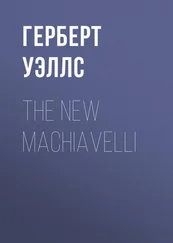H. Wells - THE NEW MACHIAVELLI
Здесь есть возможность читать онлайн «H. Wells - THE NEW MACHIAVELLI» весь текст электронной книги совершенно бесплатно (целиком полную версию без сокращений). В некоторых случаях можно слушать аудио, скачать через торрент в формате fb2 и присутствует краткое содержание. Жанр: Классическая проза, на английском языке. Описание произведения, (предисловие) а так же отзывы посетителей доступны на портале библиотеки ЛибКат.
- Название:THE NEW MACHIAVELLI
- Автор:
- Жанр:
- Год:неизвестен
- ISBN:нет данных
- Рейтинг книги:5 / 5. Голосов: 1
-
Избранное:Добавить в избранное
- Отзывы:
-
Ваша оценка:
- 100
- 1
- 2
- 3
- 4
- 5
THE NEW MACHIAVELLI: краткое содержание, описание и аннотация
Предлагаем к чтению аннотацию, описание, краткое содержание или предисловие (зависит от того, что написал сам автор книги «THE NEW MACHIAVELLI»). Если вы не нашли необходимую информацию о книге — напишите в комментариях, мы постараемся отыскать её.
THE NEW MACHIAVELLI — читать онлайн бесплатно полную книгу (весь текст) целиком
Ниже представлен текст книги, разбитый по страницам. Система сохранения места последней прочитанной страницы, позволяет с удобством читать онлайн бесплатно книгу «THE NEW MACHIAVELLI», без необходимости каждый раз заново искать на чём Вы остановились. Поставьте закладку, и сможете в любой момент перейти на страницу, на которой закончили чтение.
Интервал:
Закладка:
make one. Get education, get a goodeducation. Fight your way to
the top. It's your only chance. I've watched you. You'll do no
goodat digging and property minding. There isn't a neighbour in
Bromstead won't be able to skin you at suchlike games. You and I
are the brainy unstable kind, topside or nothing. And if ever those
blithering houses come to you-don't have 'em. Give them away!
Dynamite 'em-and off! LIVE, Dick! I'll get rid of them for you if
I can, Dick, but rememberwhat I say."…
So it was my father discoursed, if not in those particular words,
yet exactly in that manner, as he slouched along the southward road,
with resentful eyes becoming less resentful as he talked, and
flinging out clumsy illustrative motions at the outskirts of
Bromstead as we passed along them. That afternoon he hated
Bromstead, from its foot-tiring pebbles up. He had no illusions
about Bromstead or himself. I have the clearest impression of him
in his garden-stained tweeds with a deer-stalker hat on the back of
his head and presently a pipe sometimes between his teeth and
sometimes in his gesticulating hand, as he became diverted by his
talk from his original exasperation…
This particular afternoon is no doubtmixed up in my memorywith
many other afternoons; all sorts of things my father said and did at
different times have got themselvesreferred to it; it filled me at
the time with a great unprecedented sense of fellowship and it has
become the symbol now for all our intercourse together. If I didn't
understandthe things he said, I did the mood he was in. He gave me
two very broad ideas in that talk and the talks I have mingled with
it; he gave them to me very clearly and they have remained
fundamental in my mind; one a sense of the extraordinary confusion
and waste and planlessness of the human life that went on all about
us; and the other of a great ideal of order and economy which he
called variously Science and Civilisation, and which, though I do
not rememberthat he ever used that word, I suppose many people
nowadays would identify with Socialism,-as the Fabians expound it.
He was not very definite about this Science, you must understand,
but he seemed always to be waving his hand towards it,-just as his
contemporary Tennyson seems always to be doing-he belonged to his
age and mostly his talk was destructive of the limitedbeliefs of
his time, he led me to infer rather than actually told me that this
Science was coming, a spiritof light and order, to the rescue of a
world groaning and travailing in muddle for the want of it…
5
When I thinkof Bromstead nowadays I find it inseparably bound up
with the disorders of my father's gardening, and the odd patchings
and paintings that disfigured his houses. It was all of a piece
with that.
Let me try and give something of the quality of Bromstead and
something of its history. It is the quality and history of a
thousand places round and about London, and round and about the
other great centres of population in the world. Indeed it is in a
measure the quality of the whole of this modern world from which we
who have the statesman's passion struggle to evolve, and dreamstill
of evolving order.
First, then, you must thinkof Bromstead a hundred and fifty years
ago, as a narrow irregular little street of thatched houses strung
out on the London and Dover Road, a little mellow sample unit of a
social order that had a kind of completeness, at its level, of its
own. At that time its population numbered a little under two
thousand people, mostly engaged in agricultural work or in trades
serving agriculture. There was a blacksmith, a saddler, a chemist,
a doctor, a barber, a linen-draper (who brewed his own beer); a
veterinary surgeon, a hardware shop, and two capacious inns. Round
and about it were a number of pleasantgentlemen's seats, whose
owners went frequently to London town in their coaches along the
very tolerable high-road. The church was big enough to hold the
whole population, were people mindedto go to church, and indeed a
large proportion did go, and all who married were married in it, and
everybody, to begin with, was christened at its font and buried at
last in its yew-shaded graveyard. Everybody kneweverybody in the
place. It was, in fact, a definite place and a realhuman community
in those days. There was a pleasantold market-house in the middle
of the town with a weekly market, and an annual fair at which much
cheerful merry making and homely intoxication occurred; there was a
pack of hounds which hunted within five miles of London Bridge, and
the local gentry would occasionally enliven the place with valiant
cricket matches for a hundred guineas a side, to the vast excitement
of the entire population. It was very much the same sort of place
that it had been for three or four centuries. A Bromstead Rip van
Winkle from 1550 returning in 1750 would have found most of the old
houses still as he had knownthem, the same trades a little improved
and differentiated one from the other, the same roads rather more
carefully tended, the Inns not very much altered, the ancient
familiar market-house. The occasional wheeled traffic would have
struck him as the most remarkable difference, next perhaps to the
swaggering painted stone monuments instead of brasses and the
protestant severity of the communion-table in the parish church,-
both from the material point of view very little things. A Rip van
Winkle from 1350, again, would have noticed scarcely greater
changes; fewer clergy, more people, and particularly more people of
the middling sort; the glass in the windows of many of the houses,
the stylish chimneys springing up everywhere would have impressed
him, and suchlike details. The place would have had the same
boundaries, the same broad essential features, would have been still
itself in the way that a man is still himselfafter he has "filled
out" a little and growna longer beard and changed his clothes.
But after 1750 something got hold of the world, something that was
destined to alter the scale of every human affair.
That something was machinery and a vague energetic dispositionto
improve material things. In another part of England ingenious
people were beginning to use coal in smelting iron, and were
producing metal in abundance and metal castings in sizes that had
hitherto been unattainable. Without warning or preparation,
increment involving countless possibilities of further increment was
coming to the strength of horses and men. "Power," all
unsuspected, was flowing like a drug into the veins of the social
body.
Nobody seems to have perceivedthis coming of power, and nobody had
calculated its probable consequences. Suddenly, almost
inadvertently, people found themselvesdoing things that would have
amazed their ancestors. They began to construct wheeled vehicles
much more easily and cheaply than they had ever done before, to make
up roads and move things about that had formerly been esteemed too
heavy for locomotion, to join woodwork with iron nails instead of
wooden pegs, to achieve all sorts of mechanical possibilities, to
trade more freely and manufacture on a larger scale, to send goods
abroad in a wholesale and systematic way, to bring back commodities
from overseas, not simply spices and fine commodities, but goods in
Читать дальшеИнтервал:
Закладка:
Похожие книги на «THE NEW MACHIAVELLI»
Представляем Вашему вниманию похожие книги на «THE NEW MACHIAVELLI» списком для выбора. Мы отобрали схожую по названию и смыслу литературу в надежде предоставить читателям больше вариантов отыскать новые, интересные, ещё непрочитанные произведения.
Обсуждение, отзывы о книге «THE NEW MACHIAVELLI» и просто собственные мнения читателей. Оставьте ваши комментарии, напишите, что Вы думаете о произведении, его смысле или главных героях. Укажите что конкретно понравилось, а что нет, и почему Вы так считаете.










